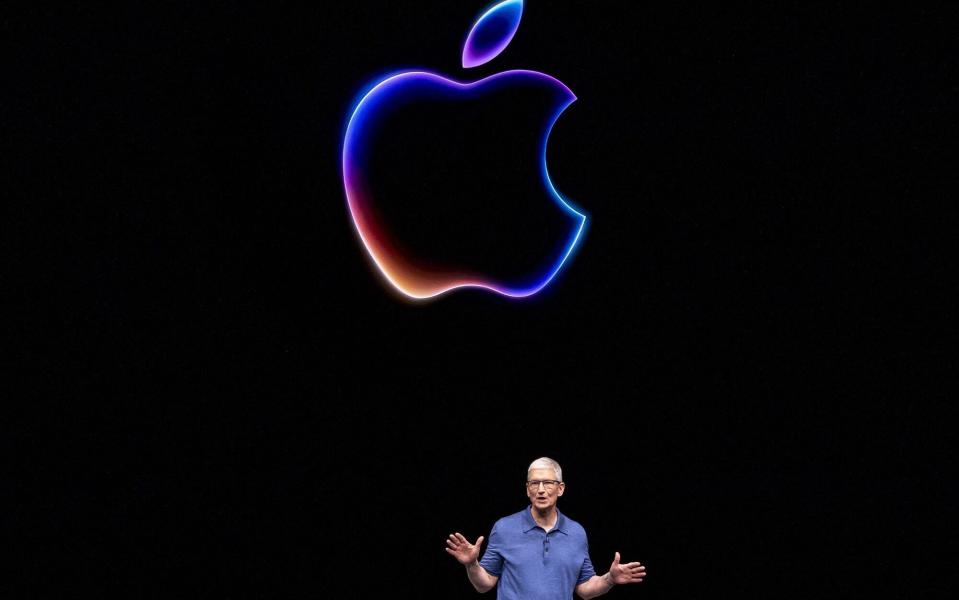Apple Intelligence: How the tech giant is overhauling your iPhone

Apple has launched itself into the artificial intelligence (AI) race with a flurry of updates to its iPhone software and a deal with OpenAI that will add ChatGPT to hundreds of millions of smartphones.
Soon, iPhone users will be able to use AI-powered technology to reply to emails, draft blog posts and presentations, create synthetic artwork and design customised emojis.
The tech giant has also revealed a major upgrade to its Siri digital assistant, giving the voice aide, which it first launched in 2011, the ability to respond to more complex queries, leaning on the power of OpenAI’s technology.
The new features – which the company has dubbed “Apple Intelligence” – come as technology businesses pile into AI. Google has already launched a series of AI tools in the form of its Gemini chatbot, while Microsoft has a deal with OpenAI for its Windows products.
Apple has been behind the crowd, but on Monday it launched an effort to catch up with AI-inspired tweaks across its latest smartphone operating system – iOS 18 – as well as on MacOS and on iPad.
When will iOS 18 be released?
Apple’s iOS 18 smartphone software, the update through which the new features will be made available, is expected to be released in September. Other hardware like Macbooks and iPads are also expected to gain access then.
What did Apple announce and what is Apple Intelligence?
Apple Intelligence is the tech giant’s spin on the new wave of AI tools coming to market, but the iPhone-maker says its technology will come with various added privacy features that set the company apart from rivals.
Like its competitors, many of Apple’s new AI products rely on so-called Large Language Models – AI tools that have been trained on billions of pages of books and articles that can generate human-sounding text or speech.
Among the tools are products that can speed up replies to emails, take notes, summarise meetings or transcribe audio. Most of Apple’s new AI features will appear in different programmes across its phones and laptops and built into its Siri voice assistant, rather than in a stand-alone app.
Apple says its AI tools are processed on the device itself or on Apple’s own servers – rather than using third-party data centres or internet infrastructure – which means its products should be more secure.
Tim Cook, Apple’s chief executive, said: “Our unique approach combines generative AI with a user’s personal context to deliver truly helpful intelligence. And it can access that information in a completely private and secure way to help users do the things that matter most to them.”
As well as its own tools, Apple will also offer access to ChatGPT for free on its iPhones – without the need to create an account.

AI-powered Writing Tools
A key plank of the latest AI tools is writing. AI chatbots can deliver human-like text and nuanced language. Apple says its AI technology will be able to proof-read and edit text across Mail, Notes, Pages and its Safari internet browser.
In Mail, Apple will use AI to redraft email replies on request or insert summaries and bullet points. The tools will also offer to change the tone of a draft message – for instance making it “friendly” or “professional”. It will also be able to provide almost automatic replies to emails – called Smart Replies – that can be sent with just a click.
The company’s new AI-writing tools will appear across its different apps, so it will offer up AI suggestions for blog posts in Safari or meeting minutes in Notes.
The company has added further tools that can automatically transcribe and record calls from the Phone app – and generate an instant summary of the call.
Smarter Siri and ChatGPT
First launched in 2011, Siri was one of the first digital voice assistants on a smartphone. But it has never been universally popular and most people rely on it for simple tasks like hands-free calls or asking about the weather.
Apple is looking to change that by adding a series of new AI features. Siri will now be able to interact with more apps and carry out tasks that involve navigating between different apps.
For instance, asking it to play a song that a friend has recommended in Messages will bring it up in the Music app. Asking Siri to “send photos from the barbecue on Saturday” will find the right pictures from your library and add them to a message.
Siri will also be able to act as a kind of guide to iOS – automatically tweaking settings or finding information from your files.
Finally, Apple has promised to make Siri even smarter in a deal with ChatGPT – effectively merging OpenAI’s chatbot with its own digital assistant for more complex requests.
Apple says: “Siri can tap into ChatGPT’s expertise when helpful. Users are asked before any questions are sent to ChatGPT, along with any documents or photos, and Siri then presents the answer directly”. ChatGPT will also integrate with Apple’s new writing features.
“Privacy protections are built in for users who access ChatGPT – their IP addresses are obscured, and OpenAI won’t store requests,” Apple adds.
AI artwork and emojis
AI art has been one of the most obvious expressions of the technology, with digitally created images of the Pope in a puffer jacket or Donald Trump being arrested by New York police going viral on social media.
Apple has added tools for creating AI images and artwork – similar to tools such as DALL-E or Stable Diffusion.

Users can access a new app called Image Playground, which can create pictures in three styles – Animation, Illustration and Sketch – and either describe the image using text or pick from pre-defined templates or themes. The tool will also be built into various apps, such as Messages and Notes.
In Messages, it can be used to send a customised sticker to friends. In Notes, it can be used alongside the Apple Pencil on iPad to turn a crude line-drawing into a work of art.
Users will also be able to create custom emojis, which Apple is calling Genmojis, by using text prompts.
Satellite messaging and everything else on iOS 18
While the AI tools are making headlines, iOS 18 will add further bells and whistles to the iPhone.
Among these are satellite text messaging. Apple is effectively setting out to end rural blackspots for iPhone users by allowing them to send text messages by connecting their phone to passing satellites, rather than broadcast masts.
The tool is limited to iMessage and SMS texts, but means your phone can still be useful without a terrestrial signal.
Apple has also announced new privacy features, such as secret hidden folders and locked apps on your phone. These will require FaceID to open and reveal their contents.
The company has also launched a new Passwords app, similar to products like 1Password or Bitwarden, which can be used to store your passwords for different apps and unlocked with a master password.
Which phones can use Apple Intelligence?
Apple has set out to perform much of the processing for its new AI apps on users’ phones – rather than relying on internet connections or third-party servers.
The company has said this means some new features will be limited to its most powerful gadgets – such as the iPhone 15 Pro, iPhone 15 Pro Max or its latest iPad and Macbook models.

 Yahoo Finance
Yahoo Finance 